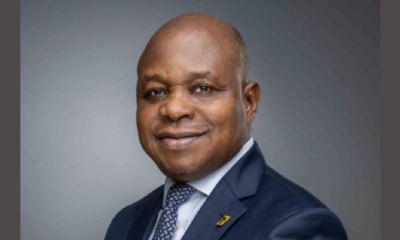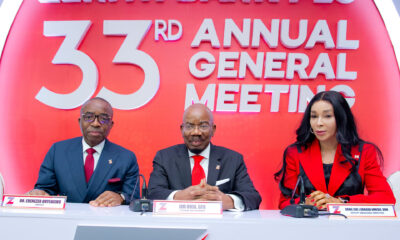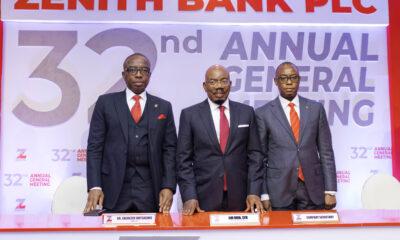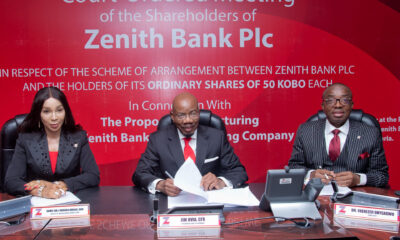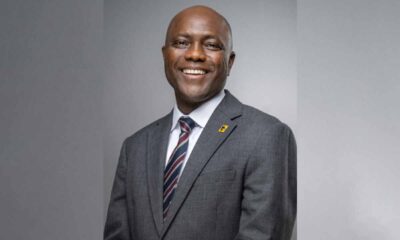The best definition of kindness is not one provided by any of the world’s best dictionaries but one demonstrated by how we treat others on a daily basis. Kindness is a universal language that does not require any special knowledge, exposure, skills, training or background to understand and appreciate it as a beneficiary or observer of a kind act. Neither is any special knowledge or training required to show and extend it to others. Just as anyone and everyone can be shown acts of kindness, all persons without exception can and ought to show and extend acts of kindness to others. Kindness flows from deep within us, from the better angels of our nature. Hence, the common idiom “the milk of human kindness”.
This is probably the backdrop to the theme “Kindness…a Way of Life”, which FirstBank has chosen for commemoration of its 2021 Corporate Responsibility and Sustainability Week (CR&S Week). This year’s CR&S Week, scheduled to hold from 26th – 30th July 2021, will feature Kind Comments Days, visits to orphanages/less privilege homes, webinars focused on the kindness theme, SPARK school engagement among other activities – lined up for each of the days. The yearly CR&S Week is a dedicated week designed to offer FirstBank staff, customers and the public opportunities to demonstrate the milk of human kindness that flows in them and give their time and resources to defined causes. It seeks to amplify FirstBank’s innate culture of giving and volunteering as embodied in its Employee Giving and Volunteering programme.
The Corporate Responsibility and Sustainability Week was introduced in 2017 as part of the bank’s longstanding Employee Giving and Volunteering programme created to enable and encourage staff to give back to society through donations and volunteering. Specially designed to reignite acts of random kindness in the society with events that are tailored to reorient people towards the right values, it provides a veritable platform for encouraging the citizenry to intentionally create positive impact in their immediate environment. One of the main highlights of the first CR&S Week was the SPARK Initiative. S.P.A.R.K stands for Start Performing Acts of Random Kindness. But originally the “S” stood for “Staff”. It was changed to “Start” to broaden the initiative beyond just staff and encourage everyone else to be part of the kindness brigade. Also, “P” originally stood for “Promoting” but was changed to “Performing” to convey the sense that participants are equally involved in actually doing kind acts and not only promoting kindness.
Held between 25 – 29 September 2017 with “Promoting Kindness: Putting You First” as theme, the maiden CR&S Week was the first of its kind in Nigeria’s financial services industry. It highlighted the role FirstBank’s corporate citizenship interventions was playing in driving positive impact across various communities – all within one compact week. It was aimed at encouraging people everywhere to step out of their comfort zones, shift attention from themselves and their personal needs to others in society who have not been as fortunate as they have and perform a random act of kindness towards them.
The first edition of the CR&S Week provided opportunity for FirstBank staff to give their time and resources to promote acts of random kindness within their communities and contribute to the welfare and well-being of others through giving and visits to orphanages/homes of the less fortunate and internally displaced people (IDPs). Within the same Week the bank held career counselling sessions with secondary school students across the six geo-political regions in Nigeria with FirstBank staff coordinating the impactful sessions that inculcated the values of financial literacy and inclusion in young students. Also, staff had the opportunity to nominate beneficiaries they believe are deserving of random of acts of kindness. Through this activity, Baby Ijeoma was nominated as one of the beneficiary that received corrective heart surgery in India which was in partnership with Vama Wave Foundation. The impact of the first edition went beyond Nigeria as FirstBank’s subsidiaries in sub-Saharan Africa and the UK also participated, benefitting people and at least 22 charities in six countries.
The second edition of the CR&S Week held from 19 – 23 June 2018. Themed “Touching Lives: You First”, the 2018 Week was intended to demonstrate FirstBank brand promise to always put stakeholders first. It focused mainly on five key initiatives/activities. First was the launch of a partnership with VisionSpring to advance social impact by providing vision screening and affordable eyeglasses for 10,000 low-income earners. This aligned with the bank’s financial inclusion and financial literacy approach of promoting accessible and affordable financial products and services to disadvantaged groups with the goal of bringing these marginalised populations into the mainstream economy, improving their chances for resilient livelihoods and financial stability. Second were giving and visits to orphanages/less privilege homes. This was the biggest platform for employee engagement during the week. It followed a needs assessment of the orphanages to be visited to enable employees donate appropriate items, and employees responded generously, donating at a scale that had never been done before. In all, eight countries witnessed this initiative while more than 26 charities participated.
Celebration of the UN International Widows’ Day on 23rd June 2018, which coincided with the last day of the CR&S Week, was the third activity. Driven by the International Women’s Society (IWS) in Lagos with whom the bank partnered to organise an empowerment outreach for 500 widows in Lagos, it provided start-up capital and capacity building required to successfully run start-ups and small businesses, to the widows. Fourth was a Career Counselling Day for over 10,000 senior secondary school students, as part of the broader FutureFirst programme of the bank aimed at ensuring the youth are empowered to be financially independent through fulfilling careers and the right financial knowledge.
Fifth and final was the SPARK (Start Performing Acts of Random Kindness) initiative, which included a SPARK Day set aside in the bank for people to act within their individual spheres of influence to promote kindness. The initiative also saw the bank receiving about 200 internal and external nominations of people deserving of kindness, out of which 24 beneficiaries were to emerge. The 2018 Week was marked across Nigeria’s six geopolitical zones with two states from each zone, totalling 12 states in all. It was also commemorated in the six countries/markets outside Nigeria where FirstBank already had subsidiaries – UK, Ghana, Democratic Republic of Congo (DRC), Guinea, Sierra Leone and Senegal.
In 2019, the CR&S Week held from 1 – 6 July 2019 with the theme “Ripples of Kindness: Putting You First”. The theme was informed by the bank’s belief that every act of kindness (regardless of how little or in whatever form) ignites a ripple effect that goes on without end. The year’s CR&S Week focused mainly on the SPARK initiative, which had gained so much traction since its humble beginnings in 2017. A Kindness Manifesto for both internal stakeholders and external stakeholders was introduced. There were other new activities or initiatives. A Nice Comments Day was introduced for the first time and scheduled to hold on the first day of the CR&S Week. The basis for it, according to the bank’s committee that oversaw the planning and implementation of the 2019 CRS Week, is the important place of words in the “kindness ecosystem”. The committee underlined this point when it noted as follows: “One of the truest reflections of how kind we are is our choice of words. That’s why we have created Nice Comments Day to help build a kinder world [through kind words].”
Another new initiative introduced in 2019 was the SPARK School Engagement, which involved launching the SPARK initiative in schools to promote the 3Cs projected as the pillars of kindness – Compassion, Civility and Charity. The schools – secondary schools across Nigeria – were to be visited to educate students on acts of kindness, encouraging them to make kindness a lifestyle. A crowd-funding initiative was also added in 2019 to enable both employees and external stakeholders donate to defined humanitarian causes, such as supporting widows, sending children (from indigent homes) to school and providing health care for the physically challenged and the old. As at August 2019, nearly N7 million had been raised through the crowd-funding initiative.
The regular initiatives/activities were also retained in 2019. There were visits to orphanages/less privilege homes. Widows’ empowerment was organised in collaboration with International Women’s Society (IWS), Nigeria to empower a select number of widows across Nigeria. The implementation in Nigeria covered the six geopolitical zones with activities held in four states per zone, amounting to 24 states in all. Six subsidiaries of FirstBank also implemented the programme in their markets/countries – UK, Ghana, DRC, Guinea, Sierra Leone and Senegal. In all, 25 schools benefitted with 6,000 students participating in terms of the School Engagement; 50 charities and NGOs, including Leap Africa and IWS, were partnered. Over 20,000 orphans/less privilege people including widows were reached and impacted.
No CR&S Week could take place in 2020 because of the COVID-19 pandemic and its associated restrictions on public gatherings and visits. But FirstBank did not just fold its hand and sit idly. The bank did something absolutely amazing, demonstrating uncommon solidarity with a vulnerable segment of society – children. Realising that the harsh effects of the COVID-19 crisis were borne disproportionally by children, whose education and thus future were being endangered due to the lockdown and prolonged closure of schools, FirstBank embarked on a mission to do something about it. Working with partners, such as IBM, UNESCO, Robert & John, Curious Learning and the Lagos State Government, it launched the bold and ambitious e-Learning Initiative designed to move one million children onto safe online learning platform. The Initiative was to minimise the disruption to children’s education, ensuring that they remained fully engaged during the difficult period and are not left behind by their peers across the (developed) world. There are already over 150,000 students benefitting from the e-Learning initiative in the height of the COVID-19 crises. In addition, the Bank deployed communication material to create more awareness of the SPARK Initiative and to sensitize staff, customers and the public during the unprecedented times.
What greater demonstration of kindness could there have been in 2020 given the circumstances the whole world found itself, especially vulnerable children? So there may not have been a CR&S Week in 2020 but the same kindness narrative that has characterised all activities of the various CR&S Week since 2017 clearly shone through FirstBank’s COVID-19 response, especially its e-Learning Initiative. In future, people would probably easily be forgiven if they assumed the e-Learning Initiative represented FirstBank’s CR&S Week in 2020. FirstBank has demonstrated uncommon consistency over the years to its Corporate Responsibility and Sustainability Week and the ideals it seeks to project through the platform. This has earned the bank the right to make the bold call that is the theme of this year’s CR&S Week.
The question is whether we will heed the clarion call to adopt kindness as a way of life. Will we go out there and extend kindness to others in ways that will make them realise that kindness is not just a word taken from the dictionary but an act that should always be expressed to others? Will we embrace kindness as our new way of life? Will we commit to making our everyday a Kind Comments Day, thus giving others permission and the strength to do the same? Will we Start Performing Acts of Random Kindness towards all and make them feel obligated to start acting kindly towards other people as their new lifestyle?


 Naira4 weeks ago
Naira4 weeks ago


 Naira4 weeks ago
Naira4 weeks ago




 Naira4 weeks ago
Naira4 weeks ago
 Commodities4 weeks ago
Commodities4 weeks ago




 Naira3 weeks ago
Naira3 weeks ago


 News4 weeks ago
News4 weeks ago
 Travel4 weeks ago
Travel4 weeks ago




 Naira3 weeks ago
Naira3 weeks ago

